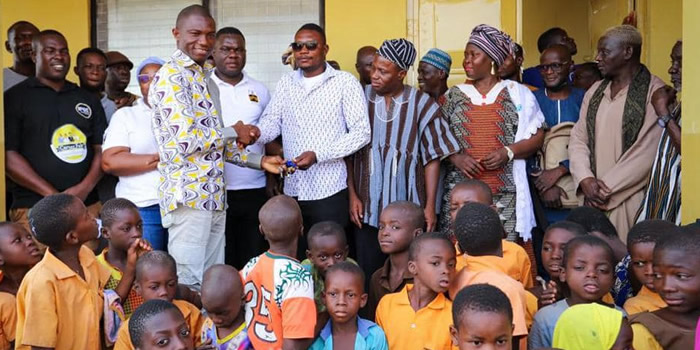

EDUCATION
KOICA and partners construct four kindergarten blocks in West, East Mamprusi
Four Early Childhood Education (ECE) facilities (kindergarten blocks) have been constructed at four basic schools in the West, and East Mamprusi Municipalities to ensure quality teaching and learning experiences for children.

Date Created : 3/21/2023 12:00:00 AM : Story Author : Albert Futukpor/Ghanadistricts.com
They will serve a total of 510 children comprising 266 boys and 244 girls in the four basic schools located at Walewale, and Nayorku in the West Mamprusi Municipality, and Zaratinga, and Burugu in the East Mamprusi Municipality of the North East Region.
Each of the four ECE facilities has two classrooms, an office, a store, a kitchen, sleeping bay, and a playground to boost children’s confidence in going to school and set the right foundation for them to achieve their full potential.
They were constructed as part of the Quality and Inclusive Early Childhood Education services for all children (QAIECE) project being implemented in the two municipalities to contribute to improving quality ECE opportunities for children from four to five years.
The QAIECE project is being implemented by the Korea International Cooperation Agency (KOICA) in partnership with ChildFund Korea, and supported by Children Believe, an international NGO, and AG Care Ghana, an NGO.
Mr. Moo Heon Kong, Country Director of KOICA, speaking at separate ceremonies in the various communities on Tuesday and Wednesday to hand over the facilities to authorities of education in the region, said education was one of the focus areas of KOICA in Ghana hence the support for ECE in the north to improve quality and access.
Mr. Kong said with the provision of the ECE facilities, “we are giving the children a good start to life” expressing belief that children in the beneficiary communities would achieve their full potential.
The QAIECE project was launched in July, 2022, after some gaps such as poor learning outcomes in kindergartens, poor kindergarten infrastructure, poor teacher capacity to use child-centred approaches in teaching amongst others were identified in the region.
Miss Hanna Ryu, Country Programme Manager, ChildFund Korea expressed the need for communities and parents to protect their children and provide their educational needs as well as maintain the facilities to serve them for a long time.
Mrs. Esenam Kavi De Souza, Country Director of Children Believe said the provision of the ECE facilities was in line with the country’s ECE Policy as well as to ensure effective implementation of the kindergarten curriculum.
Mrs. De Souza was hopeful that through the project, ECE would be given the needed attention appealing to the government and the Metropolitan, Municipal and District Assemblies to increase budgetary allocation to the ECE sector to ensure a strong educational foundation for children.
She also called on communities to support school authorities to effectively manage the facilities while expressing the need for teachers to do their best to ensure a strong foundation for children.
Mr. Joseph Kwame Wumbee, Executive Director of AG Care Ghana appealed to the communities and the Municipal Assemblies to take an active role in the maintenance of the facilities saying “This project belongs to you and its success depends largely on you.”
Mr. Michael Nsowah, Council Chairman of Ghana Education Service commended the partners for complementing the government's efforts at laying a strong educational foundation for children through the provision of quality and appropriate infrastructure.
Mr. Nsowah observed that the ECE facilities were built to standard and equipped with all the necessary facilities to improve teaching and learning for children.
Mr. Yidana Zakaria, North East Regional Minister expressed gratitude to the partners for providing the ECE facilities calling for proper care and maintenance for them to serve many children in the communities.
Meanwhile, as part of the QAIECE project, five additional ECE facilities would be constructed in the North East Region before the end of this year to bring the total number of beneficiaries to 1,015 kindergarten children comprising 517 boys and 498 girls.


 facebook
facebook
 X
X
 Youtube
Youtube
 instagram
instagram
 +233 593 831 280
+233 593 831 280 0800 430 430
0800 430 430 GPS: GE-231-4383
GPS: GE-231-4383 info@ghanadistricts.com
info@ghanadistricts.com Box GP1044, Accra, Ghana
Box GP1044, Accra, Ghana